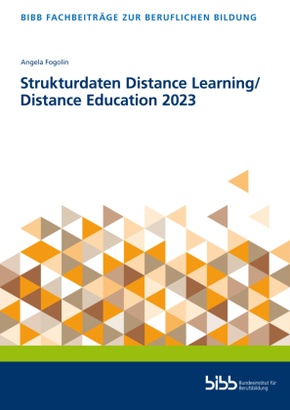| Verlag | Verlag Barbara Budrich |
| Auflage | 2023 |
| Seiten | 53 |
| Format | 21,0 x 29,7 x 0,6 cm |
| Gewicht | 235 g |
| Reihe | Fachbeiträge zur beruflichen Bildung |
| ISBN-10 | 3847428721 |
| ISBN-13 | 9783847428725 |
| Bestell-Nr | 84742872A |
Angesichts rasanter technologischer Entwicklungen und einer umfassenden Digitalisierung von Gesellschaft und Arbeitswelt gewinnt lebensbegleitendes Lernen zunehmend an Bedeutung. Nichtakademische und hochschulische Bildungsangebote in Form von Distance Learning/Distance Education bieten dabei ein etabliertes didaktisches Format, um (Weiter-)Bildung mit Erwerbstätigkeit, familiären Verpflichtungen oder aber auch Einschränkungen in der Mobilität vereinbaren zu können. Das Bundesinstitut für Berufsbildung (BIBB) erhebt daher seit 2016 - zunächst im Rahmen einer Revision der Fernunterrichtsstatistik - bei den Anbietern entsprechender Bildungsangebote jährlich Daten zur Anbieter-, Angebots- und Teilnahmeentwicklung.Die vorliegende Publikation präsentiert die Ergebnisse der diesjährigen Erhebung "Strukturdaten Distance Learning/Distance Education 2023".
Inhaltsverzeichnis:
Abbildungs- und TabellenverzeichnisAbkürzungsverzeichnisDas Wichtigste in Kürze1 Einleitung2 Methodisches Vorgehen3 Ergebnisse "Strukturdaten Distance Learning/Distance Education 2023"3.1 Gesamtrücklauf im Überblick3.2 Distance Learning3.2.1 Beteiligte Bildungsanbieter3.2.2 Distance Learning: Angebot3.2.3 Fernlernende3.2.4 Die EU-Standardisierungsinitiative von Microcredentials aus der Sicht vonBildungsanbietern3.3 Distance Education3.3.1 Beteiligte Hochschulen3.3.2 Distance Education: Angebot3.3.3 Fernstudierende und Teilnehmende3.3.4 "New Normal" in der Hochschullehre3.4 Bildungsanbieter und Hochschulen im VergleichLiteraturverzeichnisAbstract
In the light of rapid technological developments and a comprehensive digitalisation of society and the world of work, lifelong learning is becoming increasingly important. Non-academic and higher education courses in the form of distance learning/distance education offer an established didactic format for reconciling (continuing) education with gainful employment, family obligations or restrictions in mobility. The Federal Institute for Vocational Education and Training (BIBB) has therefore been collecting data on the development of providers, offerings and participation from the providers of corresponding educational offerings annually since 2016 - initially as part of a revision of the distance learning statistics. This publication presents the results of this year's survey "Structural Data Distance Learning/Distance Education 2023".

